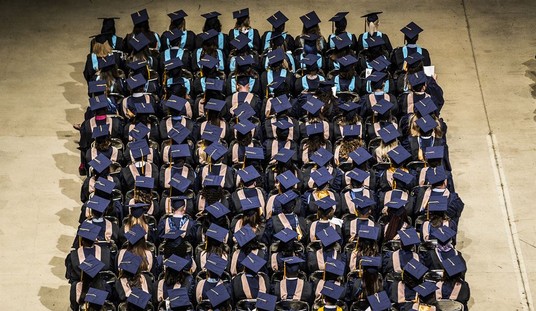Maybe I'm an outlier. Of the five siblings in my family, I'm the only one who went to college. Of the group of four guys I hung around with in school, my best friends then and now, I'm the only one who went to college. One of them went on to a career in railroading, one as a machinist, the other has worked for over 30 years for John Deere. My? I hold a bachelor's degree in Biology and an MBA in Technology Management, although I'm not sure how much return on investment I received from that graduate degree.
These sorts of statistics weren't at all uncommon in the '70s. One could have a great career without a college degree; my oldest sister graduated from high school, went to work as a switchboard operator for Northwestern Bell, and retired from AT&T as a regional vice president for human resources. But times change, and for some years now, the education establishment has been pushing an "every kid must go to college" narrative.
That's horse squeeze, of course; many kids not only don't need to go to college, but shouldn't. And, increasingly, small-town and rural kids are opting out, with many deciding on the trades instead.
As a student in western New York’s rural Wyoming County, Briar Townes honed an artistic streak that he hopes to make a living from one day. In high school, he clicked with a college-level drawing and painting class.
But despite the college credits he earned, college isn’t part of his plan.
And it doesn't need to be; Briar Townes has other plans, and he has a lot of company:
Even though rural students graduate from high school at higher rates than their peers in cities and suburbs, fewer of them go on to college.
Many rural school districts, including the one in Perry that Townes attends, have begun offering college-level courses and working to remove academic and financial obstacles to higher education, with some success. But college doesn’t hold the same appeal for students in rural areas where they often would need to travel farther for school, parents have less college experience themselves, and some of the loudest political voices are skeptical of the need for higher education.
College enrollment for rural students has remained largely flat in recent years, despite the district-level efforts and stepped-up recruitment by many universities. About 55% of rural U.S. high school students who graduated in 2023 enrolled in college, according to National Clearinghouse Research Center data. That’s compared to 64% of suburban graduates and 59% of urban graduates.
This piece distinctly glosses over what is attracting these young people instead of college, and that would be the trades. A country that makes things, a self-sufficient country, a self-sufficient community, needs welders, pipe-fitters, carpenters, electricians, machinists, mechanics, all of the skilled trades. These are honorable trades and, in all honesty, they can be very lucrative trades. Some educators, at least, are beginning to catch on:
At Perry High School, Superintendent Daryl McLaughlin said the district takes cues from students like Townes, their families and the community, supplementing college offerings with programs geared toward career and technical fields such as the building trades. He said he is as happy to provide reference checks for employers and the military as he is to write recommendations for college applications.
These schools, and not just schools in small towns and rural areas, should do far more than just "supplement" college offerings with trades education and training. They should actively promote those trades. If we are to become once more a nation that builds things, that produces, that manufactures, as President Trump has made an economic priority, we need to push the trades. Bring back shop classes in our high schools. Bring back apprenticeship programs. We could and should produce a generation of robust young men with skills they can use to make their own way in the world, useful skills and training that will enable them to make things, to repair things, to produce, and not just in the hinterlands, but in our cities as well.
Read More: Ivy League Science Spectacular Spots Queerness 'Through the Lens of Deep-Sea Creatures'
Busted! Vanderbilt University Employee Tells Camera DEI is Alive and Well (Updated)
My oldest grandson is 16. He's an avid basketball player and is apparently (what I don't know about basketball would fill several volumes) very good. But his long-term goal is to run a mechanic's shop. He's fascinated with anything driven by an internal-combustion engine. "I want to work with engines," he told his mother. "That's what I want to do."
If he shows the dedication to that as he has to basketball, he's certain to do very well. And there are millions more like him out there, who would and should pursue these goals. We should encourage them; we must encourage them. Our future as a nation may well depend on it.















